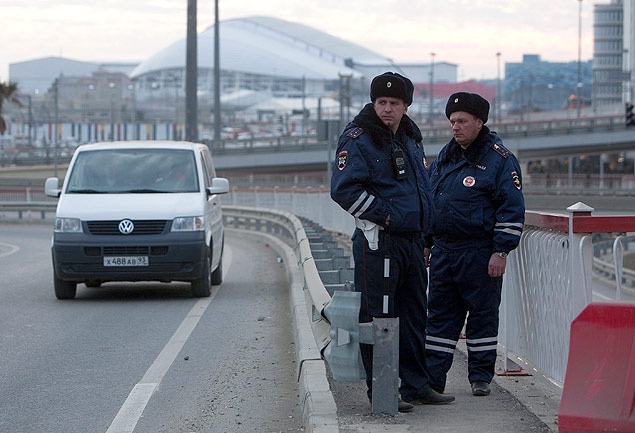Latest Photo Galleries
Brazilian Markets
12h03 Bovespa |
-0,14% | 129.028 |
16h43 Gold |
0,00% | 117 |
12h17 Dollar |
+0,39% | 5,0873 |
16h30 Euro |
+0,49% | 2,65250 |
ADVERTISING
Russia Armors Olympic Venue One Month Before the Start of Winter Games
01/08/2014 - 08h46
Advertising
FROM NEWS AGENCIES
A month before the Winter Games, Russia has upped its security in Sochi amid terrorist threats, attacks in the region, protests against the country's laws and the record cost of the Olympic Games.
The Olympic headquarters has been suffering since yesterday with extreme restrictions under the command of the powerful Federal Security Service (former KGB), an unprecedented measure in Olympic history.
Sochi is a resort town located between the Black Sea and the Caucasus Mountains, near the breakaway regions.
Entry into the city of 170 km2 of residential area (3,500 km2 total) is restricted to about 350,000 inhabitants. Comparatively, Florianópolis has 421,000 residents and a total area of 435 km2.
Now, whether by land, air or the touristic Black Sea, special authorization is necessary to enter Sochi. Military vessels and submarines patrol the coast.
During the event, held Feb. 7 to 23, only residents, those with credentials and people who have already purchased tickets will have access to the city.
Monitoring will also take place in the sky with a satellite system. The military will still use its Pantsir-S air defense system, a new generation of missiles.
Russia will also monitor communications through a system that allows access to phone calls and internet on-site.
Between police, armed forces officers and the government, about 70,000 will be responsible for Olympic security. Around 2,500 athletes from 88 countries are expected.
There were 40,000 security agents at the London Games in 2012. The Olympics in the English capital hosted 10,500 athletes from 204 countries.
Concern for safety during the Winter Games has increased after attacks on Dec. 29 and 30, when 34 people died in two suicide attacks in Volgogrado, 700 km from Sochi.
In July there was a terrorist threat from the head of Caucasus's Islamist rebellion, Doku Umarov, who called on supporters to prevent the Games "by all means."
PUTIN'S GAMES
The Winter Games are the largest event organized by Russia since the fall of the Soviet Union in 1991.
The cost of the Games is approximately US$ 50 billion (R$ 115 billion), the most expensive Olympics in history, including both its winter and summer editions.
In Beijing in 2008, there were more than 80,000 security agents and US$ 43 billion (almost R$ 100 billion) was spent, record spending until this year's Games.
Sochi is also one of the venues for the 2018 World Cup. But the record Olympic spending is part of President Vladimir Putin's budget.
The Russian president has tried to use the event to showcase himself and his country. And the Olympics are already being called the "Putin Games."
However, world leaders like presidents of the United States (Barack Obama) and France (François Hollande), and the German chancellor (Angela Merkel) will not attend the opening ceremony on Feb. 7. The gesture is considered a protest against Russia's human rights violations.
Last weekend, Putin ceded part of these pressures - including those coming from the International Olympic Committee - and authorized demonstrations against Russian laws, but only in a particular area of the city, outside the competition areas.
Before that, some countries threatened a boycott because of Putin's homophobic policies.
Last year, a law was passed that limited public acts and demonstrations by gay people.
In response, Americans will send homosexual athletes to Sochi to head their team. Now in charge of security is Janet Napolitano, former Secretary of Homeland Security of the Obama administration.
As if these problems weren't enough, the Russians still have to worry about high temperatures in the region.
Therefore, 16 million m3 of snow were stored in case the weather in Sochi does not cooperate. It's been weeks since the temperature has not dropped below zero in the region.
Translated by JILL LANGLOIS
Read the article in the original language
| Kazbek Basayev/Reuters | ||
 |
||
| Russian traffic police officers stand guard during patrol on a road near venues at the Olympic Park near Sochi |



